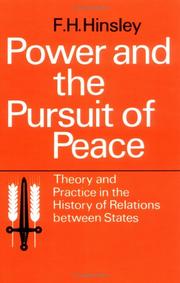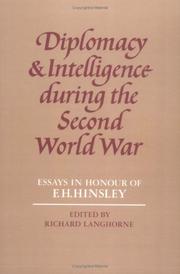| Listing 1 - 5 of 5 |
Sort by
|

ISBN: 0521094488 0521052742 0511622457 0511863624 Year: 1967 Publisher: Cambridge : Cambridge University Press,
Abstract | Keywords | Export | Availability | Bookmark
 Loading...
Loading...Choose an application
- Reference Manager
- EndNote
- RefWorks (Direct export to RefWorks)
In the last years of the nineteenth century peace proposals were first stimulated by fear of the danger of war rather than in consequence of its outbreak. In this study of the nature and history of international relations Mr Hinsley presents his conclusions about the causes of war and the development of men's efforts to avoid it. In the first part he examines international theories from the end of the middle ages to the establishment of the League of Nations in their historical setting. This enables him to show how far modern peace proposals are merely copies or elaborations of earlier schemes. He believes there has been a marked reluctance to test these theories not only against the formidable criticisms of men like Rousseau, Kant and Bentham, but also against what we have learned about the nature of international relations and the history of the practice of states. This leads him to the second part of his study - an analysis of the origins of the modern states' system and of its evolution between the eighteenth century and the First World War.
Arts and Humanities --- History --- International relations --- Peace. --- History. --- Coexistence, Peaceful --- Peaceful coexistence --- Disarmament --- Peace-building --- Security, International --- Diplomatic history --- International history (Diplomatic history) --- World history
Book
ISBN: 1316529967 1107623294 Year: 2013 Publisher: Cambridge : Cambridge University Press,
Abstract | Keywords | Export | Availability | Bookmark
 Loading...
Loading...Choose an application
- Reference Manager
- EndNote
- RefWorks (Direct export to RefWorks)
First published in 1951, this book examines Hitler's strategy and how it developed during the Second World War. Hinsley, who had worked as a code breaker during the war, uses a variety of contemporary documents as sources, including records taken from the German Naval Archives after its capture by the Allies in 1945. This book will be of value to anyone with an interest in military history in general or the Second World War in particular.
World War, 1939-1945 --- Strategy --- Naval operations, German. --- History --- Hitler, Adolf, --- Military leadership. --- Hitler, Adolf --- Gitler, Adolʹf, --- Hsi-tʻe-le, --- Hitlar, ʼAdolf, --- Chitler, Adolphos, --- Hitler, Adolph, --- Khitler, Adolf, --- Hitlerus, Adolfus, --- Hiṭlar, Aṭālpu, --- היטלר --- היטלר, אדולף,
Book
Year: 1966
Abstract | Keywords | Export | Availability | Bookmark
 Loading...
Loading...Choose an application
- Reference Manager
- EndNote
- RefWorks (Direct export to RefWorks)
Book
ISBN: 1139055879 Year: 1962 Publisher: Cambridge : Cambridge University Press,
Abstract | Keywords | Export | Availability | Bookmark
 Loading...
Loading...Choose an application
- Reference Manager
- EndNote
- RefWorks (Direct export to RefWorks)
This volume of The New Cambridge Modern History examines the period at the end of the nineteenth century.
History, Modern --- Europe --- History

ISBN: 0521268400 0521521971 0511522932 9780521268400 9780511522932 9780521521970 Year: 1985 Publisher: Cambridge Cambridge University Press
Abstract | Keywords | Export | Availability | Bookmark
 Loading...
Loading...Choose an application
- Reference Manager
- EndNote
- RefWorks (Direct export to RefWorks)
This collection of specially commissioned essays has been assembled as a tribute to Professor F. H. Hinsley, the foremost historian of British wartime intelligence. Strategic topics include the rapid collapse of France in 1940, Britain's response to it, and Russia's demand for a second front in Europe after she entered the war in 1941. Major diplomatic problems are also considered: the management of the British Foreign Office during the period of appeasement, how to prevent Franco's Spain from joining the Axis, how to handle the situation in Yugoslavia following Tito's successes with the Partisans, and Roosevelt's doctrine of 'unconditional surrender'. The book concludes with an assessment of the case against Germany over the invasion of Norway as it came before the Nuremberg Tribunal.
World War, 1939-1945 --- 2ème guerre mondiale --- Diplomatic history --- Secret service --- Histoire diplomatique --- Service secret --- Hinsley, F. H. --- Great Britain --- Grande-Bretagne --- Foreign relations --- Relations extérieures --- Secret service. --- Arts and Humanities --- History --- World War, 1939-1945 - Diplomatic history --- World War, 1939-1945 - Secret service. --- Great Britain - Foreign relations - 1936-1945. --- Diplomatic history. --- Historiography
| Listing 1 - 5 of 5 |
Sort by
|

 Search
Search Feedback
Feedback About UniCat
About UniCat  Help
Help News
News